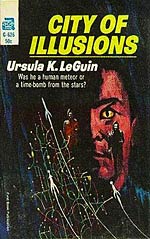
![]() spectru
spectru
7/26/2015
![]()
Ursula K Le Guin wrote city of Illusions in 1967, the third book in the Hainish Cycle, the one before The Left Hand of Darkness. Unlike The Left Hand of Darkness, City of Illusions didn't win awards and it is not on lists of books one should read. What a great oversight that is. This is a terrific book. I enjoyed it immensely.
Our protagonist stumbles out of the forest, knowing nothing, remembering nothing, naked, amnesiac. He is taken in by a clan of forest people who nurture him, teach him, and name him Falk. He stays with them for five years, and then he sets off on a great quest to the legendary city of Es Toch in the far west, to learn his true name. Along the way he encounters dangerous tribes and harsh conditions, and after a year, he reaches his destination. And there he does learn who he is.
The first part of the book is his education at the house of Zove. This is preamble. Then there is the quest, a great adventure trek. The real story happens, though, at Es Toch, the City of Ilusions, the home of the ruling Shing. There Falk learns that he is Ramarran. The story of this revelation, and how our hero copes with it, made me think of that old riddle of the two brothers at a crossroad. One brother always lies. What questions do you ask them to learn which way to go?
The first parts of the book, about three-fourths, are a standard quest story. It is well written and shows Le Guin's wonderful ability to flesh out a culture, to make strange societies completely believable. It is the last two or three chapters of the book, that make it shine - the story of Falk learning who he is and how he works out this new/old knowledge. I found his reasoning out of the Shing to be fascinating. The very ending of the book seems to set the stage for the next story, one that was never written. The Left Hand of Darkness was written in 1969 instead.
Ursula K Le Guin has become a favorite author. I've read a few of her books that were not great, but I have enjoyed most of them. After reading City of Illusions, I immediately started Planet of Exile, its precursor. Most of the books in the Hainish Cycle are only loosely related to one another. (I think there may be seven novels plus a few short stories). I believe however that City of Illusions follows from Planet of Exile, which is its direct precursor. I'll soon know for sure. At any rate, I expect that I will continue to read Ursula K Le Guin, and I definitely plan to complete the Hainish Cycle.